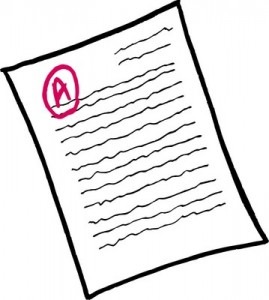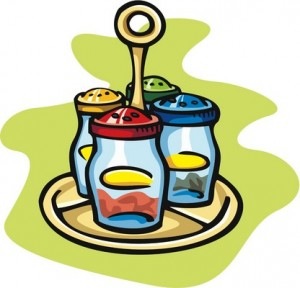 I guess one thing is for sure — you can get a sandwich — but I’m not quite certain whether it would be giant or tiny!
I guess one thing is for sure — you can get a sandwich — but I’m not quite certain whether it would be giant or tiny!
Prep For Your Big Event And Snag An A . . .
 A for Awesome, because that’s how you’ll feel.
A for Awesome, because that’s how you’ll feel.
Don’t you hate it: you’ve been so much attention to what you eat and your healthy eating habits are really getting grooved. You’re starting to feel and look great, but, oh boy, you have to go to something big. It could be a wedding, a dinner party, or dinner at a fabulous restaurant.
First thought: I’m going shopping for something great to wear.
Second thought: The food is going to be awesome. Is this going to make me blow my careful eating and, then, forget it — it’s all down hill from there.
The Dilemma
You want to enjoy yourself and be able to have some of the restaurant’s “specialty of the house” or a bunch of hors d’ oeuvres followed by a delicious piece of cake at your friend’s wedding.
What To Do?
Prep like your final exam is tomorrow.
Remember cramming for finals? Hit the books and collect some information. Research the menu of the restaurant you will be going to or call your host or event planner to find out what will be served at your event.
Many restaurants have their menus online – or you can stop in for a preview. If you nicely give your host, the caterer, or the event planner a solid reason for wanting to know the menu, you’ll be surprised at how accommodating most can be.
After you’ve researched what can be ordered and/or what will be served, you can then come up with your plan. If you want that fantastic dessert perhaps you decide to keep your hand out of the breadbasket. Do you want to have wine with dinner? Maybe forego a cocktail (or two) – and its calories – before dinner. Want the very special hors d’oeuvre? Maybe dessert gets jettisoned.
The point is: You are in control and can choose what you want to do. But planning is important. Make up your mind what you’re going to do ahead of time and commit to it.
A game time decision means that you’re making decisions when too many enticements are already in front of you. That’s not easy to do. So, do your research, come up with a plan, and stick to it. Allow yourself something special – don’t take that away. But, maybe stick to one or two special treats, not an ongoing feast. You’ll feel fantastic, in control, and tremendously proud of yourself. You’ll have had something delicious -– and your new clothes will still look just as great. Most importantly, those new healthy eating habits are still intact and have and will continue to serve you well.
Does Cinnamon Last Longer Than Oregano?
 Good question. I love spices and herbs – especially fresh herbs –but those bottles of cinnamon, cloves, allspice, and bay leaves? They might have been keeping each other company in my spice drawer since Bill Clinton was in office.
Good question. I love spices and herbs – especially fresh herbs –but those bottles of cinnamon, cloves, allspice, and bay leaves? They might have been keeping each other company in my spice drawer since Bill Clinton was in office.
Do Dried Spices And Herbs Go Bad?
Even though some cookbooks might suggest a “toss your spices after six months” rule, the major spice suppliers claim that they don’t go bad – but they do lose their strength. My Clinton era cinnamon wouldn’t make anyone sick – it just wouldn’t necessarily taste like full-fledged cinnamon.
Spice companies like McCormick and Penzeys say that if you keep dried herbs and spices in an airtight container in a cool, dry place you can keep and use them for as long as they seem to have flavor. That’s a bit of good news because it can take awhile to use up what’s in those bottles!
Here’s a tip: with a ground dry spice, shake the jar, let it settle, and give a sniff. If it doesn’t really have its spicy scent, toss it. If there’s a little fragrance left, try using more than usual amount to get the flavor you would expect from a fresh dried spice.
What About Herbs?
Herbs don’t have the longevity of spices and lose their flavor more quickly. If an herb that’s supposed to have the color of a St. Patrick’s Day shamrock looks more like the color of a pair of khakis — but it still smells wonderful when you crumble it in your hand — go ahead and use it. If it’s that khaki pants color and also has little or no aromatic smell when crumbled, then it’s probably too old to be of much flavorful use.
Some Spicy Facts
- Whole spices can last as long as 4 years
- Ground spices can last 2 to 3 years
- Leafy herbs can last 1 to 3 years, depending on the herb.
- Whole peppercorns, nutmeg, and stick cinnamon can last quite a long time.
- The same is true for the potent whole spices like cumin, cardamom, and cloves which also can live in your spice drawer for a really long time.
How To Store Them
To get the most flavor from dried herbs and spices, keep them tightly capped and away from heat, humidity, and bright, sunny places.
Putting dried herbs and spices in the freezer is not an ideal solution because condensation can be a problem. Penzeys does recommend keeping spices like whole and ground chili peppers, paprika, sesame seed, and poppy seed in a refrigerator or freezer to prolong longevity, especially in really warm weather.
Avoid shaking herbs or spices out of the bottle directly into something you’re cooking. Exposure to steam is a quick way to spoil your spices.
To Toss Or Not Guidelines
McCormick gives some “to toss or not toss” longevity guidelines:
- Ground spices (nutmeg, cinnamon, turmeric): 2 to 3 years
- Herbs (basil, oregano, parsley): 1 to 3 years
- Seasoning blends: 1 to 2 years
- Whole spices (cloves, peppercorns, cinnamon sticks): 4 years
- Seeds: 4 years (except for poppy and sesame seeds, which should be discarded after 2 years)
- Extracts: 4 years (except for vanilla, which lasts forever)
Just remember to make a note of when the heck you bought and opened the spices in the first place. And check the bottle. Some spice companies include “best by” dates on their bottles and some don’t. In addition to a “best by” date, with McCormick’s “Fresh Taster” online feature you can type in a code on the bottom of a McCormick spice bottle to verify its age and if the spice is past its prime.
A Beautiful Stressbuster
When Should I Eat?
 Hunger is a basic survival mechanism. It’s what signals our brains that our bodies need nourishment and energy — and it drives us to eat for fuel. We’re born with this ability – think about babies and how they cry when they need food – and how they stop eating when they’re full.
Hunger is a basic survival mechanism. It’s what signals our brains that our bodies need nourishment and energy — and it drives us to eat for fuel. We’re born with this ability – think about babies and how they cry when they need food – and how they stop eating when they’re full.
Those of us who struggle with our weight are sometimes disconnected from the signals that tell us when we’re hungry and when we’re full and satisfied. Some of us don’t even feel hungry because we eat so frequently that we never get to the point where our bodies knock on the door to let us know that they’re hungry.
The Hunger Scale
There is a hunger scale to help identify how hungry you are before, during and after eating. The scale goes from 1 to 10 with 1 being ravenous and 10 being so full that you feel sick.
The Scale:
- You’re ravenous and too hungry to give a hoot about what you eat
- You’re starving and absolutely must eat immediately because you’re irritable, cranky, and have no energy
- You’re hungry and the urge to eat is strong
- Your hunger pangs are signaling the first signs of hunger; you’re a little hungry
- You’re satisfied – not hungry but not full and you’re not aware of food in your stomach
- You’re fully satisfied and are aware of food in your stomach
- You’re very full, your stomach feels stretched, and you’re past the point of satisfaction but can still find room for more
- You’re uncomfortable because your stomach is too full and you really wish you hadn’t had those last few bites
- You’re stuffed, very uncomfortable, and your clothes feel very tight – that belt buckle or snap on your jeans doesn’t stand a chance
- You’re beyond full and feel sick, miserable, and you don’t want to move
What Number?
- If you’re at number 5 or above you’re not physically hungry and something else is triggering your eating.
- If you’re at number 4 you can wait to eat or eat a little bit.
- If you’re at a 2 or 3 it’s a good time to heat – have you noticed that food tastes pretty good when you’re hungry?
- If you’re at number 1 you need to eat — but pay attention to what you’re doing. When you’re starving you don’t care too much about what or how much you eat – and usually shovel food in as quickly as possible – which can result in overeating (pigging out) and ending up at a 7 and up.
- Gauge your hunger. If you’re only a little hungry, only eat a little. Preventive eating – or eating because you might be hungry in a little while – can cause you to pack in a lot of calories.
